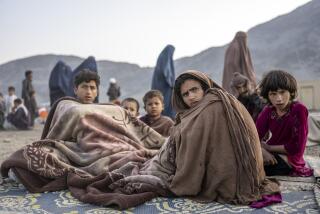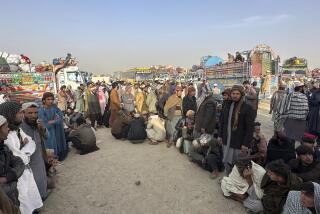Captives for the Taliban Cause
- Share via
LEJDEH, Afghanistan — Outside this remote mountain village languishes a group of self-styled Muslim warriors who carried their holy war into the ranks of Islam itself.
More than 100 Pakistani fighters are being held captive at Lejdeh, in northeastern Afghanistan, by this nation’s opposition government, which is locked in a civil war with the radical Islamic group known as the Taliban.
The opposition forces, led by former Defense Minister Ahmed Shah Masoud, have long charged that the Taliban army took control of the Afghan capital, Kabul, with the assistance of thousands of Pakistani fighters. Now they are offering proof.
The Pakistani soldiers imprisoned at Lejdeh say they were captured while fighting with the Taliban army, which imposed a draconian Islamic order when its troops conquered Kabul in 1996. The bearded, turbaned mullahs who lead the Taliban bar women from work, hold public amputations and prohibit kite-flying and marble-playing.
In a series of interviews conducted at the mud-brick jail, the Pakistani fighters said they volunteered for military service because they wanted to spread the Taliban’s vision in Afghanistan and abroad--even if that meant killing other Muslims.
Their capture underscores the fact that even as radical Islamic groups threaten the West, they are sometimes busy fighting other Muslims.
“There is no end to the jihad--it will go on until doomsday,” said Faiz Ahmed, a 17-year-old from a village in the Pakistani province of Punjab.
“We must kill the nonbelievers,” he said. “My teachers told me this.”
Like his fellow prisoners, Ahmed is a graduate of a madrasa, one of the thousands of private Islamic schools scattered throughout Pakistan. Although many madrasas preach a more measured creed, some imbue their students with a fanatical zeal to take up arms against the presumed enemies of Islam.
Pakistani officials maintain that they lend no support to the Taliban and that no volunteers from Pakistan are in the Afghan group’s military ranks. But Western diplomats say Pakistani aid has played a crucial role in helping the Taliban gain the upper hand in Afghanistan’s decade-old civil war.
The diplomats say that as much as a third of the Taliban’s 25,000-man army is made up of volunteers from Pakistan. Most of these volunteers, like their Taliban counterparts, are believed to be ethnic Pushtuns.
Afghanistan’s domestic conflict began in 1989, after the defeat of the Soviet forces who had occupied the country for a decade. Masoud’s forces held Kabul from 1992 until 1996, when the Taliban swept in.
The Western diplomats say the Pakistani government provides not only logistical support but also food and fuel to the Taliban movement, which now dominates about 85% of the country.
To the opposition leaders, the Pakistani support is the only thing that keeps the Taliban movement alive.
“If Pakistan put the Taliban under pressure, they would negotiate,” said Masoud, the opposition leader.
Ahmed, the captured fighter, said he decided to join the Taliban’s war when he was told that he would be fighting kafirs--nonbelievers. He was captured by Masoud’s forces in July 1997.
Sporting wire-rimmed glasses on a pudgy round face, Ahmed said he has since learned that his Afghan enemies practice an Islam just as devout as his.
“The Taliban are liars,” he said.
Even so, Ahmed said he is eager to rejoin the holy war--against Christians or Muslims--anywhere in the world.
“When everyone converts to Islam, then there will be peace,” he said.
Ahmed said he remains committed to killing Muslims who don’t share his views. The Taliban’s supporters adhere almost exclusively to the Sunni branch of Islam, while some of their main Afghan foes, the Hazaras, follow the Shiite branch.
“Infidels,” Ahmed said.
Western diplomats have long feared the consequences of a stream of poor and unemployed young men pouring from Pakistan’s radical madrasas. And if Ahmed is any measure, the young men held at Lejdeh will eagerly keep fighting--that is, whenever they are released from jail.
“Whatever our teachers say,” Ahmed said, “I will follow.”
More to Read
Sign up for Essential California
The most important California stories and recommendations in your inbox every morning.
You may occasionally receive promotional content from the Los Angeles Times.













